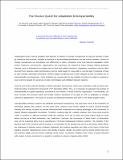| dc.contributor.author | Datta, Shoumen | |
| dc.date.accessioned | 2008-08-01T15:26:01Z | |
| dc.date.available | 2008-08-01T15:26:01Z | |
| dc.date.issued | 2006 | |
| dc.identifier.uri | http://hdl.handle.net/1721.1/41916 | |
| dc.description | A pessimist sees the difficulty in every opportunity. An optimist sees the opportunity in every difficulty. | en |
| dc.description.abstract | Interoperability between systems and adequate operational transparency may help stem some of the frustration of businesses dealing with customs. On the other hand, customs must remain vigilant to ensure security through tracking and tracing of goods to prevent disenfranchised individuals from taking advantage of the movement of objects between geographic boundaries. There are no easy “one shoe fits all” solutions to these problems. There is also room for debate regarding the depth to which customs should aspire to gain visibility of the supply chain. The investment necessary to gain visibility and transparency both in terms of cost as well as change management must be a collaborative venture between
businesses and customs. Both parties must be equally determined to securely speed the operational efficiency. However, even for pre-agreed issues, the ability to generate a bird’s eye view of the process is plagued by the lack of interoperability between customs and business systems as well as country-specific rules. | en |
| dc.description.sponsorship | World Customs Organization - Organisation Mondiale des Douanes (WCO-OMD), Brussels and
MIT Forum for Supply Chain Innovation
http://supplychain.mit.edu/shoumen | en |
| dc.language.iso | en | en |
| dc.publisher | World Customs Organization (WCO-OMD), Brussels, Belgium | en |
| dc.subject | innovation, interoperability | en |
| dc.title | Elusive Quest for Interoperability | en |
| dc.title.alternative | Charlie's Skypeout Strategy: Chocolate Factory Interoperability Initiative | en |
| dc.type | Article | en |
| dc.contributor.department | Massachusetts Institute of Technology. Auto-ID Laboratory | |
